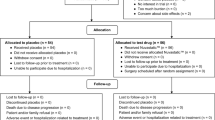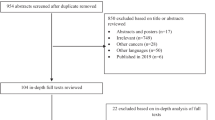Abstract
Aim
To assess the relationship between psychological distress and quality of life (QoL), cancer-related fatigue (CRF), and chemotherapy efficacy in advanced gastric cancer patients.
Methods
Advanced gastric cancer patients (39 with psychological distress and 35 without psychological distress) completed the Distress Thermometer (DT), QoL, and CRF test before receiving chemotherapy and assessed the efficacy after completing 2 courses of chemotherapy.
Results
Psychological distress was a significant factor in the efficacy of chemotherapy in advanced gastric cancer patients (χ2 = 6.324; p = 0.042). Compared to advanced gastric cancer patients with no psychological distress, advanced gastric cancer patients with psychological distress had a poorer QoL (50.41 ± 6.17 vs. 60.01 ± 7.94, t = − 5.882, p < 0.01) and more pronounced CRF (5.75 ± 1.16 vs. 3.22 ± 0.75, t = 11.231, p < 0.01) while receiving chemotherapy. FACT-G (p = 0.0035, r = − 0.4568), as well as PFS (p < 0.0001, r = 0.6599), correlated significantly with efficacy for patients in the psychological distress group. The FACT-G (p = 0.0134, r = − 0.4139) of patients in the no psychological distress group correlated significantly with efficacy.
Conclusion
Psychological distress has a negative impact on QoL, CRF, and efficacy and may be a potential risk for the efficacy of palliative chemotherapy in advanced gastric cancer patients.



Similar content being viewed by others
Data Availability
The data that support the findings of this study are available from the corresponding author, Huaidong Cheng, upon reasonable request. All authors agree to provide data to the journal for review if needed.
References
Ajani JA, Lee J, Sano T, Janjigian YY, Fan D, Song S (2017) Gastric adenocarcinoma Nat Rev Dis Primers 3:17036
Holland JC, Alici Y (2010) Management of distress in cancer patients. J Support Oncol 8(1):4–12
Chung J, Ju G, Yang J, Jeong J, Jeong Y, Choi MK, Kwon J, Lee KH, Kim ST, Han HS (2018) Prevalence of and factors associated with anxiety and depression in Korean patients with newly diagnosed advanced gastrointestinal cancer. Korean J Intern Med 33(3):585–594
Kim GM, Kim SJ, Song SK, Kim HR, Kang BD, Noh SH, Chung HC, Kim KR, Rha SY (2017) Prevalence and prognostic implications of psychological distress in patients with gastric cancer. BMC Cancer 17(1):283
Abu-Odah H, Molassiotis A, Zhao IY, Su JJ, Allsop MJ (2022) Psychological distress and associated factors among Palestinian advanced cancer patients: a cross-sectional study. Front Psychol 13:1061327
Fallowfield L (2002) Quality of life: a new perspective for cancer patients. Nat Rev Cancer 2(11):873–879
Blazeby JM, Vickery CW (2001) Quality of life in patients with cancers of the upper gastrointestinal tract. Expert Rev Anticancer Ther 1(2):269–276
Post MW (2014) Definitions of quality of life: what has happened and how to move on. Top Spinal Cord Inj Rehabil 20(3):167–180
Schütte K, Schulz C, Middelberg-Bisping K (2021) Impact of gastric cancer treatment on quality of life of patients. Best Pract Res Clin Gastroenterol 50–51:101727
Deshields TL, Potter P, Olsen S, Liu J (2014) The persistence of symptom burden: symptom experience and quality of life of cancer patients across one year. Support Care Cancer 22(4):1089–1096
Phoosuwan N, Lundberg PC (2022) Psychological distress and health-related quality of life among women with breast cancer: a descriptive cross-sectional study. Support Care Cancer 30(4):3177–3186
Bergerot CD, Philip EJ, Bergerot PG, Pal SK (2020) Distress and quality of life among patients with advanced genitourinary cancers. Eur Urol Focus 6(6):1150–1154
Brown LF, Kroenke K, Theobald DE, Wu J, Tu W (2010) The association of depression and anxiety with health-related quality of life in cancer patients with depression and/or pain. Psychooncology 19(7):734–741
Fabi A, Bhargava R, Fatigoni S, Guglielmo M, Horneber M, Roila F, Weis J, Jordan K, Ripamonti CI (2020) Cancer-related fatigue: ESMO Clinical Practice Guidelines for diagnosis and treatment. Ann Oncol 31(6):713–723
Bower JE (2014) Cancer-related fatigue–mechanisms, risk factors, and treatments. Nat Rev Clin Oncol 11(10):597–609
Shitara K, Van Cutsem E, Bang YJ, Fuchs C, Wyrwicz L, Lee KW, Kudaba I, Garrido M, Chung HC, Lee J, Castro HR, Mansoor W, Braghiroli MI, Karaseva N, Caglevic C, Villanueva L, Goekkurt E, Satake H, Enzinger P, Alsina M, Benson A, Chao J, Ko AH, Wainberg ZA, Kher U, Shah S, Kang SP, Tabernero J (2020) Efficacy and safety of pembrolizumab or pembrolizumab plus chemotherapy vs chemotherapy alone for patients with first-line, advanced gastric cancer: the KEYNOTE-062 phase 3 randomized clinical trial. JAMA Oncol 6(10):1571–1580
Park S, Nam CM, Kim SG, Mun JE, Rha SY, Chung HC (2021) Comparative efficacy and tolerability of third-line treatments for advanced gastric cancer: a systematic review with Bayesian network meta-analysis. Eur J Cancer 144:49–60
Ownby KK (2019) Use of the distress thermometer in clinical practice. J Adv Pract Oncol 10(2):175–179
Yost KJ, Thompson CA, Eton DT, Allmer C, Ehlers SL, Habermann TM, Shanafelt TD, Maurer MJ, Slager SL, Link BK, Cerhan JR (2013) The Functional Assessment of Cancer Therapy - General (FACT-G) is valid for monitoring quality of life in patients with non-Hodgkin lymphoma. Leuk Lymphoma 54(2):290–297
Zhang Q, Li F, Zhang H, Yu X, Cong Y (2018) Effects of nurse-led home-based exercise & cognitive behavioral therapy on reducing cancer-related fatigue in patients with ovarian cancer during and after chemotherapy: a randomized controlled trial. Int J Nurs Stud 78:52–60
Dalhammar K, Malmström M, Schelin M, Falkenback D, Kristensson J (2020) The impact of initial treatment strategy and survival time on quality of end-of-life care among patients with oesophageal and gastric cancer: a population-based cohort study. PLoS ONE 15(6):e0235045
Wagner AD, Syn NL, Moehler M, Grothe W, Yong WP, Tai BC, Ho J, Unverzagt S (2017) Chemotherapy for advanced gastric cancer. Cochrane Database Syst Rev 8(8):CD004064
Han L (2020) Prevalence, risk factors and prognostic role of anxiety and depression in surgical gastric cancer patients. Transl Cancer Res 9(3):1371–1383
Li W, Gan C, Zuo H, Yin X, Jing Y, Pang L, Yu S, Tang L, Yao S, Cheng H (2023) Psychological distress as risk factor for the efficacy of whole-brain radiotherapy in brain metastasis patients. Future Oncol 19(1):49–60
Ettlin DA, Napimoga MH, Meira ECM, Clemente-Napimoga JT (2021) Orofacial musculoskeletal pain: an evidence-based bio-psycho-social matrix model. Neurosci Biobehav Rev 128:12–20
Miles A, McClements PL, Steele RJ, Redeker C, Sevdalis N, Wardle J (2017) Perceived diagnostic delay and cancer-related distress: a cross-sectional study of patients with colorectal cancer. Psychooncology 26(1):29–36
Lesage P, Portenoy RK (2002) Management of fatigue in the cancer patient. Oncology (Williston Park) 16(3):373–8, 381 (discussion 381-2, 385-6, 388-9)
Stone P, Richards M, A’Hern R, Hardy J (2000) A study to investigate the prevalence, severity and correlates of fatigue among patients with cancer in comparison with a control group of volunteers without cancer. Ann Oncol 11(5):561–567
Ahlberg K, Ekman T, Wallgren A, Gaston-Johansson F (2004) Fatigue, psychological distress, coping and quality of life in patients with uterine cancer. J Adv Nurs 45(2):205–213
Syrowatka A, Motulsky A, Kurteva S, Hanley JA, Dixon WG, Meguerditchian AN, Tamblyn R (2017) Predictors of distress in female breast cancer survivors: a systematic review. Breast Cancer Res Treat 165(2):229–245
Chad-Friedman E, Coleman S, Traeger LN, Pirl WF, Goldman R, Atlas SJ, Park ER (2017) Psychological distress associated with cancer screening: a systematic review. Cancer 123(20):3882–3894
DiMatteo MR, Lepper HS, Croghan TW (2000) Depression is a risk factor for noncompliance with medical treatment: meta-analysis of the effects of anxiety and depression on patient adherence. Arch Intern Med 160(14):2101–2107
Moreno-Smith M, Lutgendorf SK, Sood AK (2010) Impact of stress on cancer metastasis. Future Oncol 6(12):1863–1881
Dai S, Mo Y, Wang Y, Xiang B, Liao Q, Zhou M, Li X, Li Y, Xiong W, Li G, Guo C, Zeng Z (2020) Chronic stress promotes cancer development. Front Oncol 10:1492
Nissen MD, Sloan EK, Mattarollo SR (2018) β-Adrenergic signaling impairs antitumor CD8(+) T-cell responses to B-cell lymphoma immunotherapy. Cancer Immunol Res 6(1):98–109
Baek JH, Lee H, Myung W, Kim H, Choi YH, Kim DK, Hong KS, Choi H (2019) The association between inflammatory markers and general psychological distress symptoms. Gen Hosp Psychiatry 56:9–12
Baritaki S, de Bree E, Chatzaki E, Pothoulakis C (2019) Chronic stress, inflammation, and colon cancer: a crh system-driven molecular crosstalk. J Clin Med 8(10):1669
Molfino A, Formiconi A, Rossi Fanelli F, Muscaritoli M (2014) Ghrelin: from discovery to cancer cachexia therapy. Curr Opin Clin Nutr Metab Care 17(5):471–6
Fu L, Feng X, Jin Y, Lu Z, Li R, Xu W, Chang VT, Hu Y, Ye X (2022) Symptom clusters and quality of life in gastric cancer patients receiving chemotherapy. J Pain Symptom Manage 63(2):230–243
Compen F, Bisseling E, Schellekens M, Donders R, Carlson L, van der Lee M, Speckens A (2018) Face-to-face and internet-based mindfulness-based cognitive therapy compared with treatment as usual in reducing psychological distress in patients with cancer: a multicenter randomized controlled trial. J Clin Oncol 36(23):2413–2421
Lei Chui P, Wai S, Lai LL, See MH, Tan SB (2021) Mindful breathing: effects of a five-minute practice on perceived stress and mindfulness among patients with cancer. Clin J Oncol Nurs 25(2):174–180
Hejazi F, Bahrami M, Keshvari M, Alavi M (2017) The effect of a communicational program on psychological distress in the elderly suffering from cancer. Iran J Nurs Midwifery Res 22(3):201–207
Clark PG (2010) Decreasing psychological distress in cancer inpatients using FLEX Care®: a pilot study. Soc Work Health Care 49(9):872–890
Rossetti A, Chadha M, Torres BN, Lee JK, Hylton D, Loewy JV, Harrison LB (2017) The impact of music therapy on anxiety in cancer patients undergoing simulation for radiation therapy. Int J Radiat Oncol Biol Phys 99(1):103–110
Lundt A, Jentschke E (2019) Long-term changes of symptoms of anxiety, depression, and fatigue in cancer patients 6 months after the end of yoga therapy. Integr Cancer Ther 18:1534735418822096
Zhang X, Zhang Y, He Z, Yin K, Li B, Zhang L, Xu Z (2019) Chronic stress promotes gastric cancer progression and metastasis: an essential role for ADRB2. Cell Death Dis 10(11):788
Funding
This work was supported by the grants from the National Natural Science Foundation of China (No. 81872504).
Author information
Authors and Affiliations
Contributions
Conceptualization: Huaidong Cheng, Chen Gan, and Yongkang Zhang; methodology: Wen Li and Jian Xu; resources: Yongkang Zhang and Lulian Pang; writing—original draft preparation: Yongkang Zhang and Chen Gan; writing—review and editing: Chen Gan and Wen Li; and funding acquisition: Huaidong Cheng; Yongkang Zhang and Chen Gan contributed equally to this work. All authors have read and agreed to the published version of the manuscript.
Corresponding author
Ethics declarations
Competing interests
The authors declare no competing interests.
Institutional review board statement
The study was conducted in accordance with the Declaration of Helsinki and approved by the Institutional Review Board of Research Ethics Committee of the Second Affiliated Hospital of Anhui Medical University (Number of Ethical Approval: 2012088).
Conflict of interest
The authors declare no competing interests.
Additional information
Publisher's Note
Springer Nature remains neutral with regard to jurisdictional claims in published maps and institutional affiliations.
Rights and permissions
Springer Nature or its licensor (e.g. a society or other partner) holds exclusive rights to this article under a publishing agreement with the author(s) or other rightsholder(s); author self-archiving of the accepted manuscript version of this article is solely governed by the terms of such publishing agreement and applicable law.
About this article
Cite this article
Zhang, Y., Gan, C., Xu, J. et al. Psychological distress as a risk factor for the efficacy of chemotherapy in advanced gastric cancer patients. Support Care Cancer 31, 669 (2023). https://doi.org/10.1007/s00520-023-08143-1
Received:
Accepted:
Published:
DOI: https://doi.org/10.1007/s00520-023-08143-1




